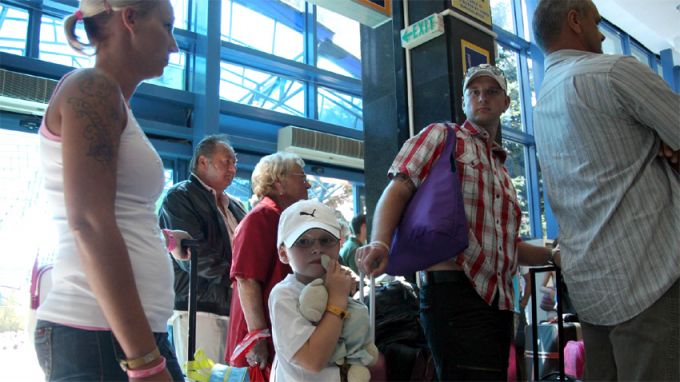
Since the beginning of 2014 the conflict between Russia and Ukraine has significantly reduced export of Bulgarian goods to the region. Export-oriented companies from different sectors of the Bulgarian economy suffered losses. These are manufacturers of petroleum and bitumen materials, pharmaceutical companies, and agricultural producers. The number of tourists from Russia and Ukraine declined, as well as the number of deals with holiday properties.
According to preliminary data of the National Statistical Institute, for the period January - October 2014, exports of Bulgaria to Ukraine decreased by 63 percent, which equals some 236 million euros, compared to the same period of 2013, as the losing companies are mostly manufacturers of building materials and pharmaceutical companies.
After in response to sanctions by the EU and the US, Moscow banned imports of agricultural products from the EU, USA, Canada, and Australia, this had a negative effect on Bulgarian exports, too. The decline of exports to Russia from the beginning of 2014 to the end of October was 8.6 percent, which equals some 40 million euro. Exporters of fruits and vegetables, the dairy industry and fisheries were among the worst affected. However, Bulgaria exports less than 1 percent of its agricultural produce to Russia, according to a report of DG AGRI of the European Commission, prepared shortly after the measures taken by Moscow.
The decline of the ruble led to a number of economic problems in Russia. A number of large Russian tour operators went bankrupt. EU travel restrictions on state-owned companies and enterprises also led to a slight decline of the number of Russian tourists in Bulgaria. Here is more from Svetlana Atanasova, Executive Director of the Bulgarian Association of Travel Agents (BATA).
"Overall, currency fluctuations affect travels, because this is a service that is easy to cancel. But given that Bulgaria is in the lower price category, we hope that the decline will not be huge. There is a slight decrease in the number of reservations compared to the past winter.”
Annually, Bulgaria is visited by an average of about 7.5 million foreign tourists and tour operators will try to compensate for the reduced number of Russian tourists and attract more tourists from Romania, Greece and Turkey.
The declining number of Russian tourists also affected the holiday home market. Currently about 360,000 apartments, mainly on the southern Black Sea coast, are the property of Russians, according to data by the Russian embassy. Vice-President of the National Real Estate Association, Emil Ganev, believes that the geopolitical crisis in Ukraine has led to the decline of the number of both Russian and Ukrainian customers:
"This decline is somewhere around 10 percent. At the end of the year the ruble dropped a lot, which affected the savings of Russian citizens. Russian who had savings in rubles lost most of them. And if they had intentions of buying a real estate property abroad they would have probably postponed it. On the other hand, in such a situation, when a national currency depreciates fast people often look at investing money in property as one of the best opportunities."
English: Alexander Markov
More than EUR 1 billion will be invested in agriculture and rural areas in Bulgaria in 2025. According to a decision by the Monitoring Committee of the Strategic Plan for Agricultural Development, the funds are aimed at modernizing agriculture and..
Bulgaria’s industry is being transformed in the direction of high added value productions, reads an analysis by the Institute for Market Economics. This tendency is best manifested in computer science, electronics and optics which account for the..
Acceleration of inflation to 1.1% in October compared to the previous month was registered by the National Statistical Institute. On an annual basis, the index is 1.8 percent. In October, the prices of goods and services for..
Butter and vegetable oil are the products that have increased in price the most over the year. The retail price of vegetable oil will range between 3..

+359 2 9336 661
